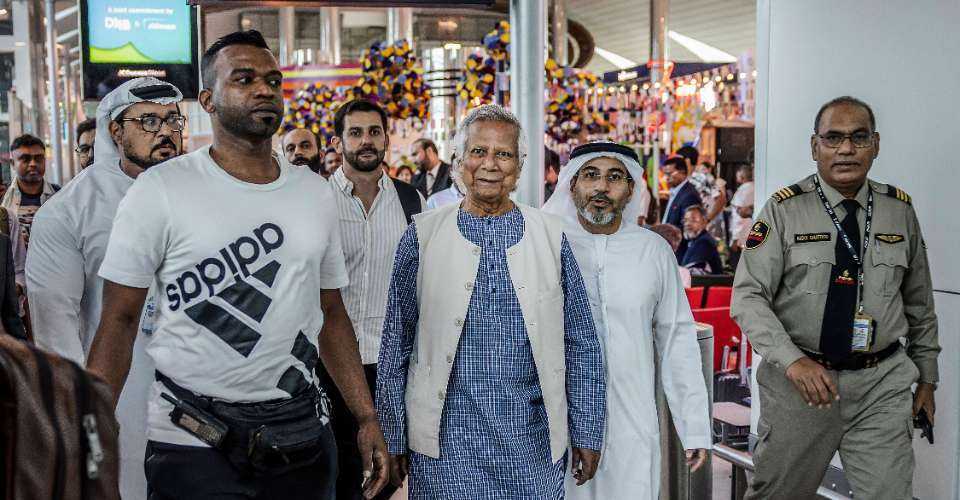
Nobel laureate Muhammad Yunus (center) is escorted by Emirati security personnel as he walks through Dubai International Airport before boarding a flight to Dhaka, in Dubai on Aug. 8. Yunus is expected to lead a caretaker government after a student-led uprising ended the 15-year rule of Sheikh Hasina. (Photo: AFP)
What started as a peaceful student protest calling for reforms to government job quotas became a mass uprising that forced the prime minister of Bangladesh to resign and flee the country.
That historic day was Aug. 5, when millions marched towards Gonobhaban in central Dhaka, the official residence of Sheikh Hasina, who was re-elected in a controversial election just seven months ago.
The process of forming an interim government led by Nobel Laureate Muhammad Yunus is underway. The goal is to hold an election to transfer power.
While the country goes through this transition, and people call the end of Hasina’s 15-year rule a “second independence.” There are deep scars in public memory.
It seems unimaginable now that she is the daughter of Bangladesh’s founding father, Sheikh Mujibur Rahman, who led the liberation war of Bangladesh in 1971 against the social, economic, and political deprivation of people by the then authoritarian Pakistani regime.
How could things have gone thus far when the students’ demands for quota reforms were already met? One has to examine the whole issue deeply.
How did Hasina falter?
First, Hasina did not act properly and timely. She played tactical, saying the quota issue was under the court’s purview. Early this June, the High Court ruled that the government’s decision to scrap all quotas that existed until 2018 was illegal. The ruling meant restoring the quota system, which triggered student protests.
It is important to note that until 2018, the quota for government jobs was 56 percent: 30 percent for freedom fighters’ families, 10 percent for women, 10 percent for people from underdeveloped districts, 5 percent for ethnic communities, and 1 percent for people with disabilities. Student protests in 2018 led to the scrapping of this system.
As the current protests against quota restoration continued, the government on July 23 ordered the implementation of a new 7 percent quota. It reserved 5 percent of government jobs for freedom fighters’ families, 1 percent for people with disabilities, and 1 percent for ethnic communities. The remaining 93 percent would be based on merit.
Second, on July 15, in response to a question at a press conference, Hasina said: “Why is there so much resentment against the Liberation War and the freedom fighters? If the grandchildren of the freedom fighters don’t get quotas, then should the grandchildren of the razakars get quotas?”
Razakar is a derogatory term used against those who collaborated with the Pakistani military against people fighting for liberation in 1971.
The protesting students were angered and chanted slogans, “Who am I, and who are you? Razakar, Razakar. Who said that? Autocrat, autocrat.”
Third, on July 16, Awami League General Secretary Obaidul Quader said the Bangladesh Chhatra League (BCL), the student wing of the ruling Awami League, was ready to respond to the “audacity” of the anti-quota protesters. That triggered BCL activists to attack the peaceful demonstrators and invite counterattacks on July 18.
Thus, the protests spiraled and spread to various parts of the capital Dhaka and other cities across Bangladesh. More people joined the demonstrations.
Authorities then deployed additional police, including the Rapid Action Battalion and Border Guard Bangladesh. Violent clashes ensued, and more than 200 were killed, mostly youths. Non-protesters and even children were killed after being caught up in the violence. Thousands were injured and more than 11,000 were arrested in the last two weeks.
On July 20, the government declared a curfew and shut down the internet for almost a week.
Such mindless killings, arbitrary arrests, and the detention of six organizers of the Anti-Discrimination Student Movement (ADSM) for several days, who were forced to make statements calling for an end to the protests, caused further agitation.
Following the release of the six organizers on Aug. 1 came a more robust demand. The organizers demanded an investigation into the violence and the release of all detainees.
During a huge rally in Dhaka on Aug. 3, the protesting students demanded the resignation of Hasina and her cabinet. The protesters pledged not to return home without achieving their objective, though the prime minister sought to hold a dialogue with its leaders.
By now, people from different walks of life had started publicly expressing solidarity with the students.
On Aug. 4, supporters of Hasina’s party — the Awami League — took positions in various parts of Dhaka and elsewhere armed with sticks and lethal arms, which ultimately led to violent clashes with protesters, killing about 100.
Bangladeshis were already living in dire conditions, with inflation hitting 10 percent. Most people were angry because of Hasina’s misrule for the past 15 years and poll machinations, which rendered them unable to freely exercise their vote in the last three elections in 2014, 2018, and 2024.
The parliament had been largely ineffective, and policies and systems helped party leaders and cronies of the regime amass wealth and stash much of it outside the country.
Awami League was accused of talking much about the spirit of the Liberation War, democracy, socialism, and secularism but failing to walk the talk.
The blame for the violence, especially the destruction of public property in Dhaka during the July protest, was put on the opposition Bangladesh National Party and its ally the Jamaat-e-Islami, their affiliated bodies, and religious extremist groups.
Exactly who was behind the destruction of public property requires an independent investigation.
The Awami League and its affiliated bodies portrayed the anti-government demonstrators as anti-liberation forces. This was a dangerous game, dividing the nation by resurrecting an old debate that started in 1971.
Ways forward
After Hasina’s fall, a new government is in the making, and this presents an opportunity to heal old scars and usher in real reforms.
The first job of the interim government could be to create a high-powered body to probe the killings. A credible investigation and punishing all responsible is the first condition for healing the wounds.
Second, the government needs to take responsibility for treating the injured. It should also release all those under illegal detention. The wronged must be paid compensation. This will help build confidence for future dialogue among various stakeholders.
The government must institute democracy through basic reforms in the political, governance, economic, and education sectors. Bangladesh’s lack of free and fair elections is a real problem. The Election Commission and poll laws must be revised to ensure transparency and accountability. The game of money and muscle power must stop.
Separation of the judiciary and executive should be exercised rather than kept only on paper. The Anti-Corruption Commission must be made effective to punish guilty public officials. Each oversight body, including the parliamentary ones, must be made functional.
Ending governmental corruption will have a ripple effect on the private sector. To this end, the bureaucracy needs a complete overhaul to eliminate cronyism. Creating a conducive business environment will be important for local and foreign investors and young entrepreneurs.
Bangladesh’s education system also needs massive reforms. Global-standard education with technical, scientific, and managerial skills is the only way forward in creating jobs for youths at home and abroad.
The new government must embrace and practice the progressive values enshrined in the nation’s founding principles. Equality and pluralism should be the mainstay in all spheres of society. There should be no divisive politics and democratic values must be instilled in all sections of society.
Most importantly, the interim government must hand over power to a democratically elected government. The government’s most critical job will be managing the economy, aiming to improve the nation’s overall development.
If not, inflation will continue to rise and people will continue to migrate. That would also create more poor people in Bangladesh.

